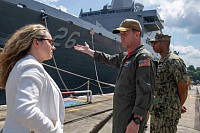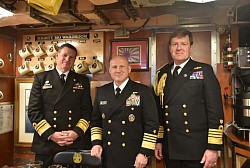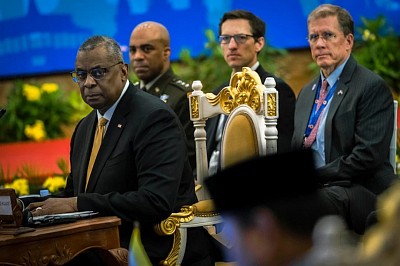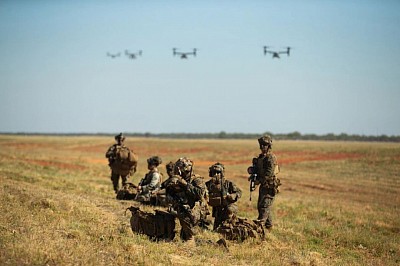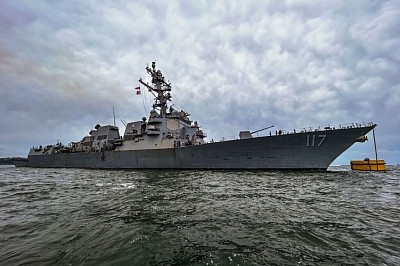AUKUS Plan Looks to Shore up Deterrence, Promote Stability
Tailoring U.S. Outreach to Indo-Pacific Allies, Partners
The Indo-Pacific is a vast complicated region with nations of varying capabilities, capacities and needs, and U.S. strategy in the region must be equally varied, said Lindsey W. Ford, deputy assistant secretary of defense for South and Southeast Asia.
At the Center of Strategic and International Studies 2023 Indo-Pacific Conference today, Ford emphasized that the United States' network of allies and friends are the basis for maintaining peace, prosperity and stability in the region
The Indo-Pacific is a vast complicated region with nations of varying capabilities, capacities and needs, and U.S. strategy in the region must be equally varied, said Lindsey W. Ford, deputy assistant secretary of defense for South and Southeast Asia.
At the Center of Strategic and International Studies 2023 Indo-Pacific Conference today, Ford emphasized that the United States' network of allies and friends are the basis for maintaining peace, prosperity and stability in the region.
Ford directly pushed back on the idea that U.S. troops in the Indo-Pacific are somehow destabilizing and provocative. "I would say the United States military has been forward and present in the Indo-Pacific region for decades," she said. "I think you can look back, historically, and that there is solid evidence for the fact that the presence has helped … maintain peace and stability in the region."
Changes to U.S. force posture in the Indo-Pacific are "a response to changes in the security environment, not forcing changes in the security environment," she said. "And I think if that were not true, we would not have allies and partners who are so interested in having the United States there more."
Spotlight: Focus on Indo-Pacific
Globally and regionally, China is "the pacing threat" for the United States. China is actively seeking to overturn the international rules-based order that has kept the peace in the region since World War II. The United States works with allies and partners to maintain security and stability in the region.
South Korea, Japan, the Philippines, Thailand, Australia and New Zealand are treaty allies of the United States, and strategy with those countries is tied to those mutual defense treaties. The United States is also partnered with many nations in the region and deals with them bilaterally, multilaterally and through international organizations like the Association of Southeast Asian Nations. ASEAN includes Brunei, Cambodia, Indonesia, Laos, Malaysia, Myanmar, Philippines, Singapore, Thailand and Vietnam.
Ford used U.S. engagements with ASEAN; the Quad — India, Japan, Australia and the United States; and the Australia-United Kingdom-United States agreement as examples of the breadth of U.S. efforts in the Indo-Pacific. "I think we've been pretty clear repeatedly that we see ASEAN, the Quad, AUKUS as complementary efforts that are not in competition with each other," she said. "We're constantly providing reassurance … that we do not believe that something like an Asian NATO is relevant to the Indo-Pacific."
"That's true," she continued. "But I think if you believe that, then you also have to be comfortable with the idea that there are going to be varied and complimentary kinds of security groupings and networks that you engage through because there's not going to be any single one size fits all model in the Indo-Pacific."
AUKUS is very specific and is aimed at drawing the industrial bases of the three nations closer together and strengthening deterrence in the region.
Spotlight: AUKUS: The Trilateral Security Partnership Between Australia, U.K. and U.S.
While the Quad has a defense portion, the biggest portion is economic and political, Ford said. The organization delivers a lot of public good in the region including sharing vaccines, cyber and cybersecurity infrastructure development and more.
ASEAN is a unique forum for defense leaders in the region to talk about transnational threats, like maritime security, cybersecurity and military medicine, Ford said. The organization "is the only kind of institution that is really all encompassing like that and touches on so many broad different areas in the Indo-Pacific," she said. "I think that's one reason we think it's very unique and special."
There is a move toward a more multilateral approach to security in the region. She used the Shangri-la Dialogue held earlier this month as an example. In the past, the U.S. secretary would meet with fellow defense ministers individually. "Increasingly, when we go to the Shangri-la Dialogue, we meet with allies and partners together," she said.
Secretary of Defense Lloyd J. Austin III participated in two trilateral meetings with allies and informal meetings with a group of four. "We met with all of the Southeast Asian defense ministers together," she said. "The bottom line is, we feel that what we are working with partners right now to deliver results to make a more resilient, more practically oriented security network that is actually delivering results for everybody."
indo-pacfic aukus asean
Subscribe to Defense.gov Products
Choose which Defense.gov products you want delivered to your inbox
U.S. DepartmentofDefenseSearchHomeNewsSpotlightsAboutLegal & AdministrativeU.S. Partnership With U.K., Australia Enhances Securi
In September 2021, the U.S., Australia and the U.K. announced a new partnership, AUKUS, meant to strengthen alliances and security, especially in the Indo-Pacific. In March, plans for moving forward on the first pillar of that new partnership were announced. This involves delivering a conventionally-armed, nuclear-powered submarine capability to Australia
On Capitol Hill yesterday, Mara Karlin, assistant secretary of defense for strategies, plans, and capabilities, discussed furthe
Development of new technologies, Karlin said, are critical to U.S. defense and to the defense of AUKUS partners. The AUKUS partnership will create opportunities for cooperation that will advance the development and availability of those new technologies.
"As President [Joe] Biden and Secretary Austin have said, AUKUS is a generational opportunity," Karlin said. "Together with our AUKUS partners, we have identified several advanced capability opportunities in areas that range from artificial intelligence and quantum to hypersonics. Over time, the work we do will advance our own capabilities, as well as our partners’, and will enable us to address the challenges that we will collectively face.
Today more than ever, she said, there is a not only a benefit, but an imperative to expand defense technology-sharing practices, and AUKUS will be a part of that.
The AUKUS partnership, Karlin said, also provides an opportunity to streamline defense cooperation and to identify sticking points that make information or technology sharing a challenge.
"We need to widen the aperture; foster collaborative defense innovation; advance military interoperability with our allies and partners; and leverage our collective strengths as a force multiplier," Karlin said. "AUKUS has provided a lens into not only what military capabilities our closest allies need, but also what barriers exist that hamper pursuit of our integrated national security strategy and how we need to adapt our approach to meet our national security objectives."
The administration, Karlin told lawmakers, plans to consult with Congress on legislative changes that will allow increased exemptions to licensing requirements for AUKUS partners and make easier the transfer of both unclassified and classified defense articles and services.
"This bold approach is critical to ensuring the AUKUS partnership continues to innovate and to progress to meet the challenges of the global security environment," she said.
About :
Skip to main content (Press Enter).
An official website of the United States Government
U.S. DepartmentofDefense
Search
Back
About
Leadership
Secretary of Defense
Deputy Secretary of Defense
Chairman of the Joint Chiefs of Staff
Vice Chairman of the Joint Chiefs of Staff
Office of the Secretary of Defense
More Leaders
Components
Army
Marine Corps
Navy
Air Force
Space Force
Coast Guard
National Guard
Combatant Commands

